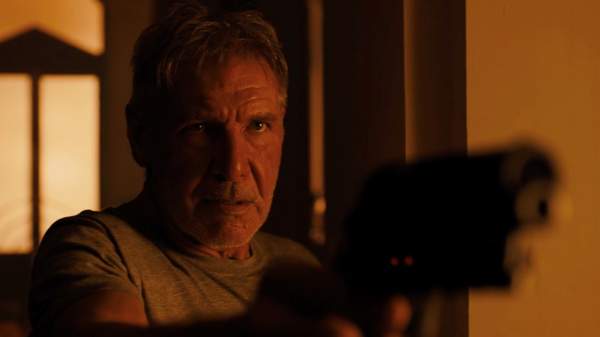Overview
Do sci-fi fans dream of immersive future worlds, neon visuals scored by dark synth notes, and existential musings on what it means to be human? Yes, and they dream of Blade Runner 2049. The sequel to Ridley Scott's influential 1982 film comes to cinemas with a task that's harder than spotting a replicant — or, more accurately, a task that's quite comparable. Directed by Arrival's Denis Villeneuve, and written by the original's Hampton Fancher with Logan's Michael Green, can this follow-up deliver the real deal, or just a convincing copy?
The answer, in fitting Blade Runner style, isn't as simple as that. Audiences won't spend decades arguing about it; rather, they'll lap up a movie that's every bit as spectacular as its predecessor, largely because it's built from similar pieces. Taking its cues from the other Harrison Ford behemoth that recently received a long-awaited next instalment — aka Star Wars — Blade Runner 2049 finds the right balance between venturing forward and nodding to the past. With a noir-ish, detective-focused narrative, and plenty of time spent pondering the difference between artificial and flesh-and-blood life, the film proves both a bold second chapter and a loving pseudo-remake.
Set 30 years after the events of the first feature, Blade Runner 2049 follows Los Angeles cop K (Ryan Gosling), a blade runner charged with finding and "retiring" old androids. In the intervening period, replicants have fallen out of favour, then come to the fore again in newer, more compliant models, and ultimately found something of an equilibrium with humanity, with tech tycoon Niander Wallace (an ill-placed Jared Leto) leading the charge. Alas, K's latest case threatens the fragile harmony between man and machine, while also leading him to someone who once had his job: an older but far-from-friendlier Rick Deckard (Harrison Ford).
That description might seem sparse on details, but the 164-minute film itself is anything but. In soaring overhead shots of crumbling urban sprawl, grey-hued storage facilities, and orange-tinted landscapes, cinematographer Roger Deakins (Skyfall) serves up a masterclass in making every image look like it belongs in an art gallery. In each thrum and drone of the score from Benjamin Wallfisch (It) and Hans Zimmer (Dunkirk), moodiness and mystery intertwine with a rollercoaster of emotion. And, in Gosling's stoic turn at the centre of it all, a look over the top of an upturned collar, and a pause during a slow walk, say much more than the dialogue. Playing a hologram that embodies the next technologically assisted step in the quest for connection, Ana de Armas (War Dogs) proves similarly effective.
For a film that overwhelms with its extraordinary sights and echoing sounds, Blade Runner 2049 revels in the little things, and in the potent cumulative toll that they can have. Accordingly, it paints a broad, bleak picture of the past dictating the future that's vivid and convincing because it takes the time to soak in the minutiae — be it the glow of a busy street, the texture of a dead tree or the sorrow in a grizzled face. Again, it's apt — as adapted from Philip K. Dick's Do Androids Dream of Electric Sheep?, the franchise's dystopian vision started with Deckard checking for incriminating glimmers in replicants' eyes, with a tiny flash telling a much bigger tale. Villeneuve achieves the cinematic equivalent, making each moment resound with meaning while honouring the legacy of the original.
Oh, and if you thought that every sci-fi flick over the past 35 years took its cues from Blade Runner — and they did — prepare for three further decades of new movies doing the same with Blade Runner 2049.
